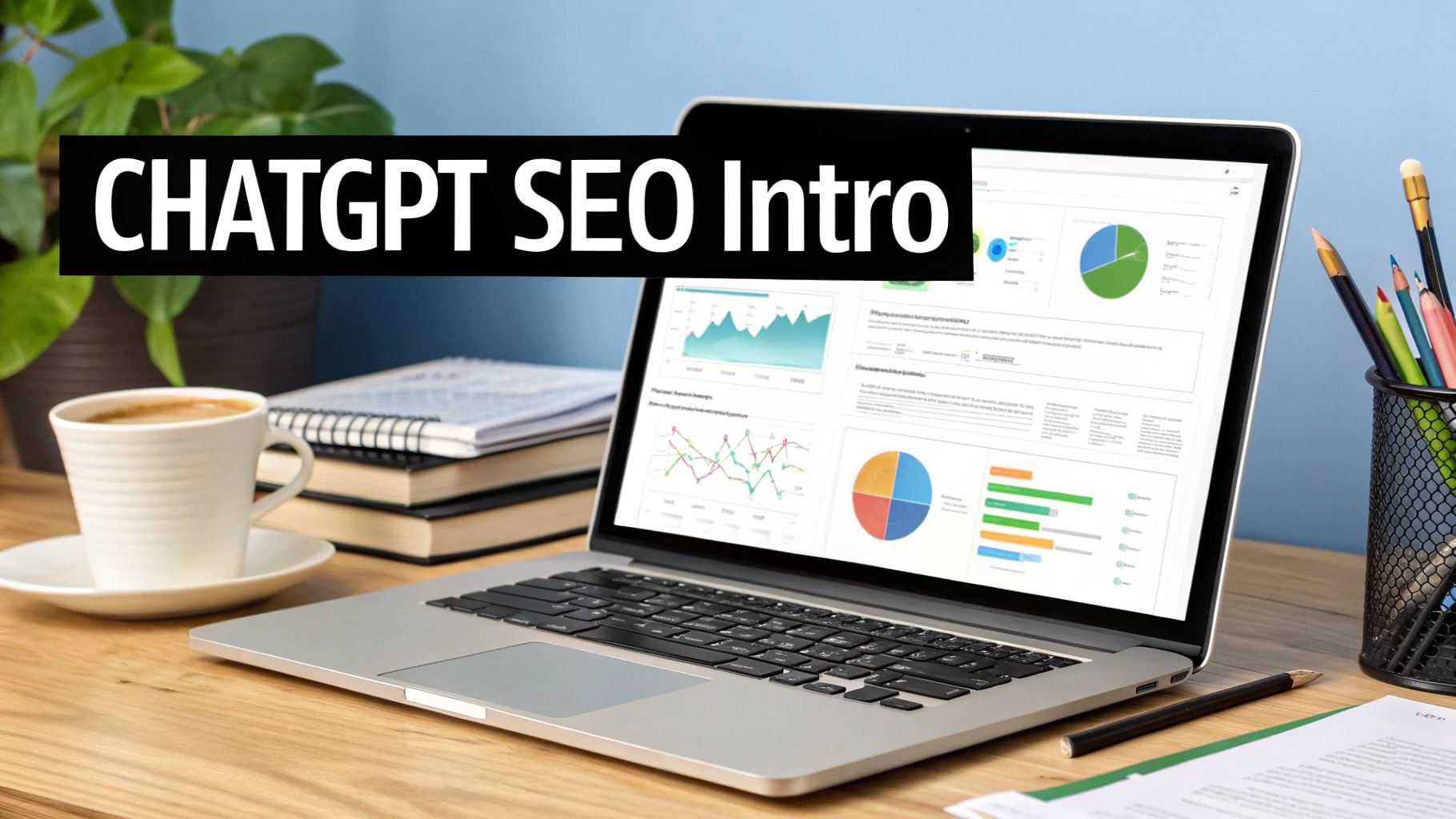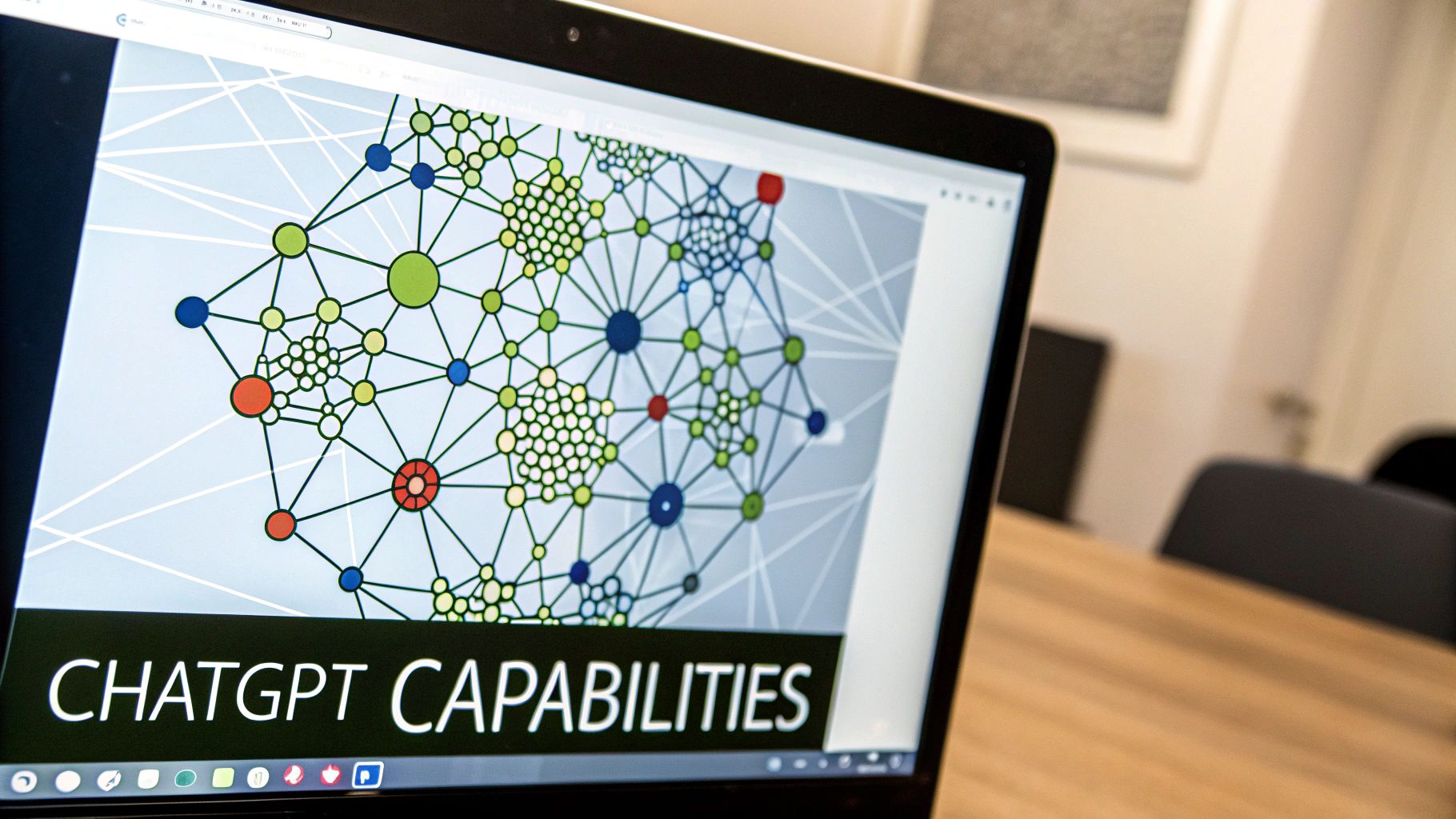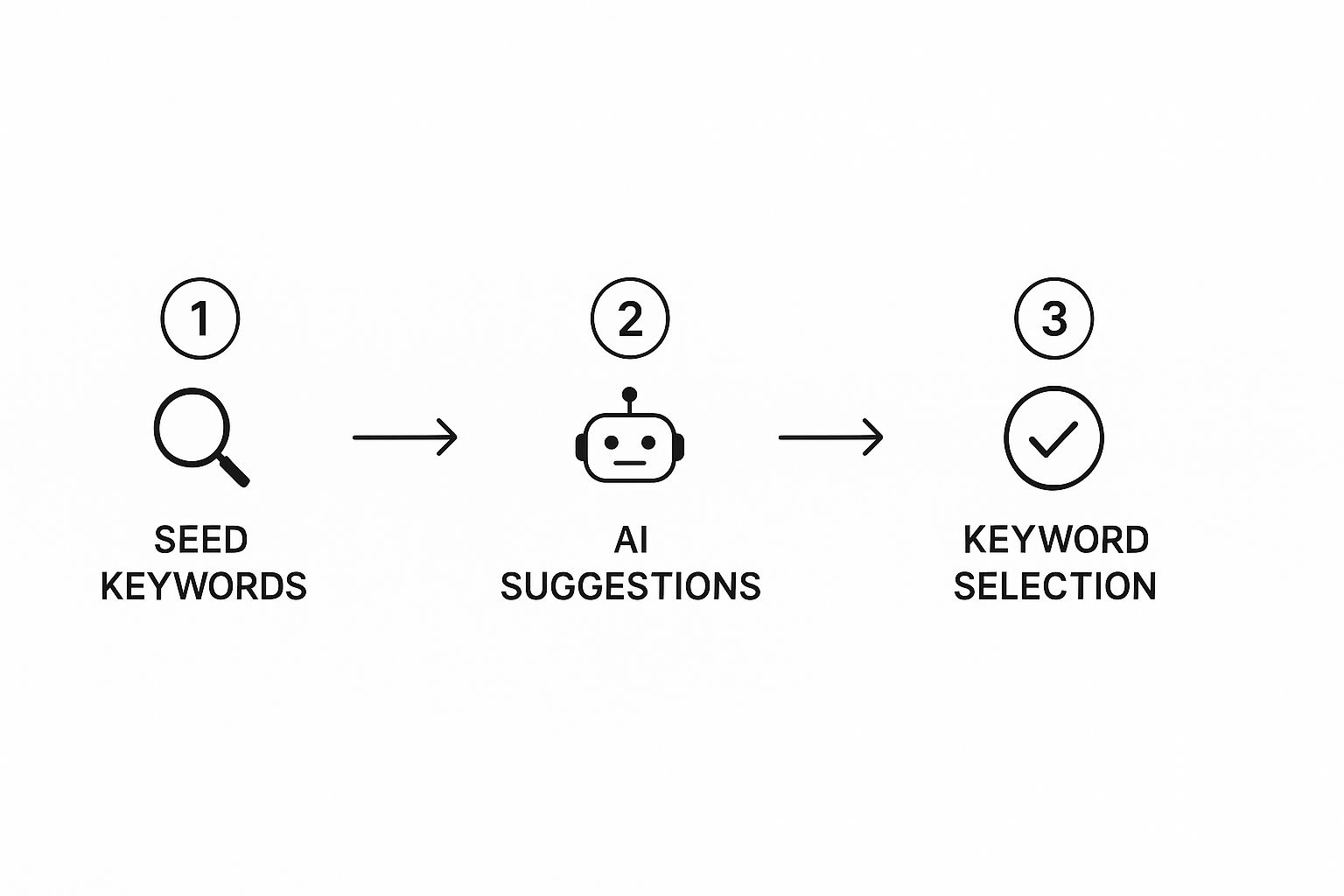ChatGPT SEO: How AI Transforms Your Search Strategy
Learn how to master ChatGPT ranking factors to ensure your content is not just found, but cited by AI search engines. By optimizing for AI retrieval and synthesis, you can significantly boost your brand's visibility in the generative search era.
Understanding ChatGPT SEO Beyond The Hype

This screenshot shows the clean and simple ChatGPT interface. Here, users type in prompts and receive AI-generated responses. But this simplicity hides a powerful potential for SEO. ChatGPT can generate text, translate languages, write various creative content, and answer questions informatively.
Think of traditional SEO as building a solid foundation for your house. ChatGPT SEO is like having a set of power tools that help you build a much more intricate and impressive structure on top of it. It's not about replacing the core SEO principles, it's about amplifying them. It's about working smarter, not just faster.
Recent research analyzing over 400,000 pages has revealed that Content-Answer Fit is the strongest predictor of ChatGPT citations, accounting for 55% of ranking relevance. Understanding these factors is crucial for modern ChatGPT SEO.
Let's say you're writing a blog post about the "best hiking boots." Normally, you'd use keyword research tools like SEMrush to find related search terms. ChatGPT SEO takes you a step further.
Elevating Keyword Research and Content Creation
With ChatGPT, you can delve into the intent behind these searches. What are people really looking for when they type "best hiking boots"? Are they after reviews? Comparisons? Specific features like waterproofness or breathability? Or maybe they're just focused on price. This deeper understanding lets you create content that truly addresses user needs - a crucial element for ranking.
This approach leads to more relevant content, higher engagement, and improved search rankings. ChatGPT can also help you generate content variations. This allows you to target a broader range of keywords and connect with a larger audience.
ChatGPT's popularity has exploded. As of early 2026, it was receiving roughly 37.5 million searches per day. That's impressive, but it's still small compared to Google's 14 billion daily searches. Interestingly, content optimized with ChatGPT's assistance has seen an 18% ranking boost. This shows its real potential for improving SEO performance. Want to dig deeper into these stats? Discover more insights.
Streamlining Technical SEO and Scaling Operations
ChatGPT SEO isn't just about content. It can also help with technical SEO. Imagine using it to generate schema markup or optimize your site structure. This frees up SEO pros to focus on more strategic tasks.
Think about using ChatGPT to create a complete XML sitemap or automate tedious chores like writing meta descriptions. Suddenly, you have more time to focus on high-level strategic planning for your SEO campaigns.
ChatGPT also helps you scale your SEO operations. You can use it to automate content audits, analyze competitor strategies, and even generate performance reports. This doesn't mean humans are out of the picture. Instead, it's about using AI to handle repetitive tasks so your team can concentrate on creative and strategic work that needs human expertise. This boosts efficiency and lets your team focus on the big picture. By understanding the nuances of ChatGPT SEO, you can unlock its power to create a truly effective and robust SEO strategy.
Content Creation Revolution: AI Meets SEO Writing

This screenshot shows the ChatGPT interface. Users type in prompts and receive AI-generated text. This simple interface holds a lot of potential for ChatGPT SEO content creation. It can generate various content formats, from blog posts and articles to even poetry.
Imagine having a co-writer who understands both search engines and your audience. That's the potential of ChatGPT for SEO. It helps create content that resonates with readers while also following SEO best practices. This isn't about replacing human creativity; it's about enhancing it.
Crafting Compelling, SEO-Friendly Content
Successful content creators are using AI to overcome writer's block and build comprehensive topic clusters. For example, instead of staring at a blank page, a writer could give ChatGPT a topic like "benefits of organic gardening."
ChatGPT can then generate a list of subtopics, like:
- Soil health
- Pest control
- Nutritional value
This helps writers structure their content and ensures they cover all the key aspects of a topic. ChatGPT can also help create content briefs that align with search intent, ensuring content is relevant to what users are searching for.
This focus on search intent is crucial. ChatGPT can generate meta descriptions designed to attract clicks. It can also help craft long-form articles that rank well and engage readers. The key is finding the right balance between AI efficiency and human creativity. You want to use AI's analytical power without losing your unique brand voice. You might be interested in Sellm's perspective on Generative Search Optimization.
Optimizing Content for Both Search Engines and Humans
Practical workflows are essential for successful ChatGPT SEO. AI can improve readability, incorporate keywords naturally, and ensure content satisfies both search engines and human readers. Think of it as having an editor who understands algorithms.
One major advantage is the ability to create personalized content. Marketers using ChatGPT have reported a 14% increase in customer satisfaction due to personalization. ChatGPT's multilingual capabilities have also led to a 20% audience increase for some businesses. For more details, explore these ChatGPT statistics.
Let's take a look at how AI-driven content creation stacks up against traditional methods. The following table summarizes some key performance differences:
| Metric | Traditional Method | ChatGPT-Assisted | Improvement |
|---|---|---|---|
| Time to create | High | Medium | Significant |
| Content Quality | Variable | Consistent | Moderate |
| SEO Performance | Moderate | High | Significant |
| Content Personalization | Difficult | Easy | Significant |
Avoiding Generic AI Content
While ChatGPT is powerful, it's important to avoid creating generic content. Over-reliance on AI can lead to bland, repetitive text. The key is to use ChatGPT as a starting point, then add your own insights, experiences, and creativity. This makes your content stand out and connect with your audience. By understanding ChatGPT SEO, you can create informative and engaging content that drives better results.
Strategic Keyword Research With AI Intelligence

This infographic shows how to use ChatGPT for keyword research. Think of it as a roadmap, starting with basic keywords and using AI to suggest better, more specific ones. The process helps you discover valuable search terms and frees up time for strategic planning.
Forget manually combing through endless keyword lists. ChatGPT SEO changes the game by finding hidden search patterns, spotting content gaps, and building topic clusters that search engines love. Savvy SEO professionals combine ChatGPT with established keyword tools like Ahrefs for even more effective strategies.

This Ahrefs screenshot shows how it complements ChatGPT. Ahrefs gives you hard data on search volume and competition. ChatGPT helps you understand what people are really searching for and suggests creative keyword variations. Together, they provide a powerful approach to keyword strategy.
Mastering Prompt Engineering For Keyword Discovery
Crafting the right prompt is like asking a detective the right questions. Targeted prompts unlock semantic variations, long-tail keywords, and unique content angles. Imagine your seed keyword is "vegan recipes." Asking ChatGPT, "What are some long-tail keyword variations for 'vegan recipes' focusing on specific cuisines?" could uncover gems like "vegan Ethiopian recipes" or "vegan gluten-free desserts."
ChatGPT can also analyze your competitors' content. It's like having a detective uncover clues about what they're missing. This allows you to create content that fills those gaps, attracting a wider audience. Interested in learning more about the intersection of AI and SEO? Check out this post: AI and SEO.
Practical Applications Across Diverse Industries
This approach works across various industries. A local bakery could use ChatGPT to find keywords related to "gluten-free birthday cakes" in their city. An e-commerce store selling hiking gear might uncover long-tail keywords like "best lightweight hiking boots for women with wide feet." This allows for highly targeted marketing. In B2B, ChatGPT can generate keywords related to specific industry trends, challenges, and solutions, helping businesses reach a specialized audience.
The following table illustrates a practical workflow for keyword research using ChatGPT:
| Step | ChatGPT Prompt Type | Expected Output | Next Action |
|---|---|---|---|
| 1 | Seed Keyword Input | "vegan recipes" | Refine the seed keyword based on business goals. |
| 2 | Long-Tail Keyword Request | List of long-tail keywords (e.g., "vegan Ethiopian recipes," "vegan gluten-free desserts") | Analyze search volume and competition for suggested keywords using tools like Ahrefs. |
| 3 | Competitor Content Analysis | Insights into competitor keywords and content gaps | Develop content strategy addressing identified gaps and incorporating high-potential keywords. |
| 4 | Content Angle Generation | Unique content ideas related to the seed keyword (e.g., "Top 10 Vegan Recipes for Beginners") | Create compelling content optimized for target keywords and search intent. |
This workflow streamlines the keyword research process, making it more efficient and effective. By leveraging ChatGPT's AI capabilities, businesses can gain valuable insights into search trends and create content that resonates with their target audience.
Technical SEO Enhancement Through AI Automation

This screenshot shows Google Search Console, a vital tool for keeping an eye on your website's health and technical SEO. Think of it as your website's report card. Here, you can see how many people click on your site in Google search results (clicks), how often your site appears in those results (impressions), and any problems Googlebot has crawling your site. Understanding these metrics is key for a successful ChatGPT SEO strategy. These insights help you spot technical weaknesses and see how changes made with ChatGPT are actually working.
Technical SEO can feel overwhelming. But with AI by your side, it becomes much more manageable. Imagine ChatGPT as a helpful colleague who speaks both "tech" and "SEO" fluently. It can translate complex code into plain English, bridging the gap between technical details and effective SEO strategies.
From Schema Markup to Site Structure: AI-Powered Solutions
ChatGPT can handle several tricky technical SEO tasks. Take schema markup, for example. This is special code that helps search engines understand your content. Instead of writing complex JSON-LD by hand, you can ask ChatGPT to create it for you, specifying your content type, important details, and the format you need.
Optimizing your site structure also gets easier with ChatGPT. Imagine having a consultant who can whip up an optimized sitemap tailored to your content and target keywords. This makes navigation smoother for both search engines and users, boosting your SEO. Plus, ChatGPT can create robots.txt files, which tell search engine crawlers where to look (and where not to look) on your site. This ensures Googlebot crawls your site efficiently.
Automating Technical Audits and Identifying Crawlability Issues
ChatGPT can even audit your website's technical health. It's like a tireless assistant that can crawl your entire site looking for broken links, slow loading times, and other crawlability issues. It then suggests practical steps to fix them, making the whole process much simpler.
For example, ChatGPT can analyze your site's Core Web Vitals, key metrics for user experience and SEO. Think of these as your website's vital signs. ChatGPT can even create plans for improving them, even if you don't know how to code. This makes technical optimization accessible to everyone, regardless of their technical skills.
Streamlining Technical Communication and Optimizing for Mobile
Explaining tricky technical issues to non-technical team members can be a real challenge. ChatGPT can help you translate technical jargon into everyday language. Let's say you need to explain mobile-first indexing to your marketing team. ChatGPT can write a clear, concise explanation that everyone can grasp, fostering better communication and teamwork.
What's more, ChatGPT can generate technical documentation. This helps developers understand SEO needs and ensures consistency across your website. By turning complex technical SEO tasks into smaller, more manageable jobs, ChatGPT empowers SEO pros and businesses to take control of their technical SEO and achieve better results.
Scaling SEO Operations With 5 AI Workflows
This screenshot from Zapier shows how easy it is to connect different apps and automate tasks. Zapier's like a universal translator, letting your software "talk" to each other and kick off actions based on certain events. This is a game-changer for scaling ChatGPT SEO.
Think about your current SEO process. It's probably a bunch of manual steps. Keyword research in one tool, content creation in another, performance tracking in a third. Each step takes time and effort. ChatGPT SEO, combined with automation tools like Zapier, can link these separate steps into one smooth, efficient workflow.
Automating Content Audits, Competitor Analysis, and Reporting
Smart SEO teams are using ChatGPT to scale their operations without sacrificing the human element. Imagine automating tedious tasks like content audits. ChatGPT can analyze your existing content, spot areas for improvement, and even suggest fresh topics based on what people are searching for right now. This frees up your team to focus on the strategic side of content - the planning and creative parts.
Competitor analysis gets a speed boost, too. ChatGPT can quickly dissect competitor websites, figure out their target keywords, and uncover content gaps. This intel is pure gold for building a winning content strategy. For more on this, check out our article on Outrank AI Blog Automation. Even performance reporting can be partly automated. ChatGPT can pull data from multiple sources, summarize it, and even generate basic reports. This lets SEO pros focus on interpreting the data and figuring out what actions to take.
Building Custom ChatGPT Workflows for SEO Management
Building custom workflows with ChatGPT lets you tailor its power to your specific needs. Take content gap analysis, for example. You can train ChatGPT to find topics your competitors are ranking for that you're missing out on. This can uncover golden opportunities to create content that attracts a whole new audience.
Another example is link building outreach. While a personal touch is always best, ChatGPT can help with initial drafts, making sure your messages are grammatically sound and relevant to the person you're contacting. This streamlines the outreach process, helping you connect with more potential partners.
Integrating With Popular SEO Tools for Seamless Workflows
Integrating ChatGPT with other SEO tools unlocks a new level of efficiency. Imagine combining ChatGPT's analytical power with the data-driven insights from platforms like SEMrush or Ahrefs. This creates a powerful synergy, making in-depth keyword research, rank tracking, and competitor analysis a breeze.
For instance, you could use ChatGPT to brainstorm keywords and then use SEMrush to check their search volume and competition. This data-driven approach makes sure you're going after keywords with the best chance of success. Or, you could use Ahrefs to find backlink opportunities and then use ChatGPT to craft personalized outreach messages.
Maintaining Quality Control and Strategic Oversight
Automation is amazing for efficiency, but quality control is still key. Human oversight is essential. You need to make sure any AI-generated content matches your brand's voice and meets your quality standards. Reviewing and editing all AI-generated content before it goes live is a must. Think of ChatGPT as a skilled assistant, not a replacement for human expertise.
Strategic oversight is crucial, too. AI is great for repetitive tasks, but human SEO professionals need to set the overall strategy, understand the data, and make smart decisions based on their experience and gut feeling. This ensures AI is working for your SEO goals, not just automating tasks without a clear purpose.
Empowering Your Team for Effective Collaboration With AI
To get the most out of ChatGPT SEO, you need to train your team to work effectively with AI. Make sure everyone understands what AI can and can't do, and how it fits into the overall SEO strategy. This empowers team members to contribute to scaled SEO efforts while keeping standards high. By learning how to integrate ChatGPT into your processes, you can empower your team, scale your efforts, and get better SEO results.
Measuring Success In The ChatGPT SEO Era
Let's talk about measuring success with ChatGPT SEO. It's a different ballgame than traditional SEO. We need to look beyond the usual metrics and focus on what truly matters: real business impact and growth.
Tracking AI-Assisted Content and Workflow Effectiveness
Imagine you've got a shiny new kitchen gadget, like a stand mixer (that's ChatGPT). You're not just interested in whether it turns on; you want to know how it improves your baking. Does it make your cakes fluffier? Does it save you time?
The same goes for AI in SEO. We need to understand its impact. Are we getting more organic traffic? Are our conversion rates higher? Are we ranking better for the keywords we care about?
The key is setting up proper tracking. We need to be able to distinguish between AI-assisted content and content created without AI. This allows us to see which AI tools and techniques are actually making a difference.
This screenshot shows Google Analytics, an essential tool for tracking website traffic. It tells you where your visitors are coming from, which pages they're visiting, and how long they're staying. This data is gold for evaluating your ChatGPT SEO strategy. By analyzing traffic sources and user behavior, you can pinpoint which AI-driven content strategies are bringing in the most valuable visitors.
Analyzing SEO Data with ChatGPT: Uncovering Hidden Trends
ChatGPT can be a powerful data analysis partner. Think of it as an assistant that can comb through mountains of analytics data and highlight the important trends. It can spot patterns that a human might miss, leading to new insights and better strategies.
Say you see a sudden increase in traffic from a particular keyword. ChatGPT can help you understand why. Is it because of a recent blog post? A shift in search trends? Knowing these drivers allows you to seize opportunities and stay ahead of the game.
Measuring Content Performance and ROI of AI Investments
Measuring the real return on investment of AI in SEO requires looking at the big picture and the fine details. Clicks and rankings are important, but we also need to track conversions, leads, and ultimately, revenue.
This is where tools like Sellm, which specializes in GEO and brand monitoring in AI environments, can be incredibly useful. Sellm tracks your brand's visibility on AI platforms like ChatGPT, Claude, and Perplexity. Start with our free ChatGPT rank tracker tool to check your current position, then explore our guide on the best AI search tracker tools. This is essential for understanding how your brand is perceived in the AI-powered search world. By tracking these metrics, you can connect your AI-powered SEO efforts directly to business results.
Creating Effective Reporting Systems and Adapting to the Future
Reporting isn't just about presenting numbers; it's about telling a story. We need to show clients or leadership how AI is adding value. This means clear before-and-after comparisons and demonstrating the impact of our AI investments. ChatGPT can even help summarize reports and highlight key takeaways, making the information easier to understand.
And because the AI world is constantly evolving, we need to be flexible. Our measurement approach needs to adapt along with the technology. This means keeping up with new metrics and adjusting our tracking methods as needed. By continuously learning and refining our measurement strategies, we can ensure our ChatGPT SEO efforts remain effective in the long run.
Future-Proofing Your ChatGPT SEO Strategy
This screenshot shows the OpenAI website, the birthplace of ChatGPT. It highlights how easy it is to access this powerful AI, hinting at its vast potential across many fields, including SEO. The simple design emphasizes user-friendliness, suggesting that incorporating ChatGPT into your SEO workflow might be easier than you think.
SEO is a constantly moving target. Staying on top of your game means understanding where ChatGPT and AI are headed. Forward-thinking SEO pros are getting ready for the future today.
Adapting to the Evolving Search Landscape
Search engines are becoming more sophisticated in how they process AI-generated content. This will inevitably change our understanding of what truly influences search ranking. Keeping your SEO strategy effective requires a close eye on these shifts.
For instance, imagine search engines prioritizing content with obvious signs of human touch and editing. Or picture them developing new methods to detect and penalize low-quality, AI-only content. Such a change would benefit content creators who use AI as a supportive tool, rather than a complete replacement for human creativity.
The role of ChatGPT in SEO is expected to grow significantly. Projections suggest it could capture 1% of the search market by 2026. While this might seem small, it indicates ChatGPT's increasing relevance in online search. Want to dive deeper? Check out this article: Discover insights into ChatGPT's market share.
Understanding the Shift in User Behavior
AI-powered search is transforming how people look for information. Users now anticipate more personalized, conversational search results. This has a direct impact on your SEO strategy, requiring content that resonates with these changing expectations.
Think about the rise of voice search. People are increasingly using natural language to ask questions, not just typing keywords. This means optimizing your content for long-tail keywords and conversational phrases. Grasping these shifts in user behavior is essential to remaining relevant in the age of AI-driven search.
Practical Steps for Staying Competitive
To stay ahead of the curve with ChatGPT SEO, continuous learning and adaptation are key. Keeping pace with the latest advancements in AI and their impact on SEO is crucial. This could involve attending industry conferences, enrolling in online courses, or engaging with relevant online communities.
Building flexibility into your SEO strategy is also important. This allows you to react swiftly to changes in the AI and SEO landscape. Think about adjusting your keyword research methods or refining your content creation process as new AI tools and techniques emerge.
Continuous Learning and Adaptation Frameworks
Creating a framework for adapting to change is vital for future-proofing your ChatGPT SEO initiatives. This might involve regularly reviewing your existing strategies, testing new AI tools and techniques, and monitoring their impact on your SEO performance.
By adopting a mindset of continuous learning and experimentation, you can position yourself for success in the dynamic world of ChatGPT SEO. This proactive approach will help ensure your strategies stay effective and relevant, no matter what the future holds.
Ready to supercharge your SEO strategy with AI-powered insights? Learn how Sellm, a platform specializing in GEO and brand monitoring in AI environments, can maximize your visibility on platforms like ChatGPT, Claude, and Perplexity. Visit Sellm.io today.
